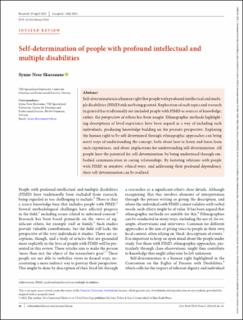Self-determination of people with profound intellectual and multiple disabilities
Peer reviewed, Journal article
Published version
Permanent lenke
https://hdl.handle.net/11250/3048763Utgivelsesdato
2022Metadata
Vis full innførselSamlinger
- Artikler / Articles [1198]
- Publikasjoner fra CRIStin [1148]
Sammendrag
Self-determination is a human right that people with profound intellectual and multiple disabilities (PIMD) risk not being granted. Exploration of such topics and research in general has traditionally not included people with PIMD as sources of knowledge; rather, the perspective of others has been sought. Ethnographic methods highlighting descriptions of lived experience have been argued as a way of including such individuals, producing knowledge building on the person's perspective. Exploring the human right to be self-determined through ethnographic approaches can bring novel ways of understanding the concept, both about how to listen and learn from such experiences, and about implications for understanding self-determination. All people have the potential for self-determination, by being understood through embodied communication in caring relationships. By fostering relations with people with PIMD in sensitive, ethical ways, and addressing their profound dependency, their self-determination can be realized.
Beskrivelse
This is an open access article under the terms of the Creative Commons Attribution License, which permits use, distribution and reproduction in any medium, provided the original work is properly cited.

